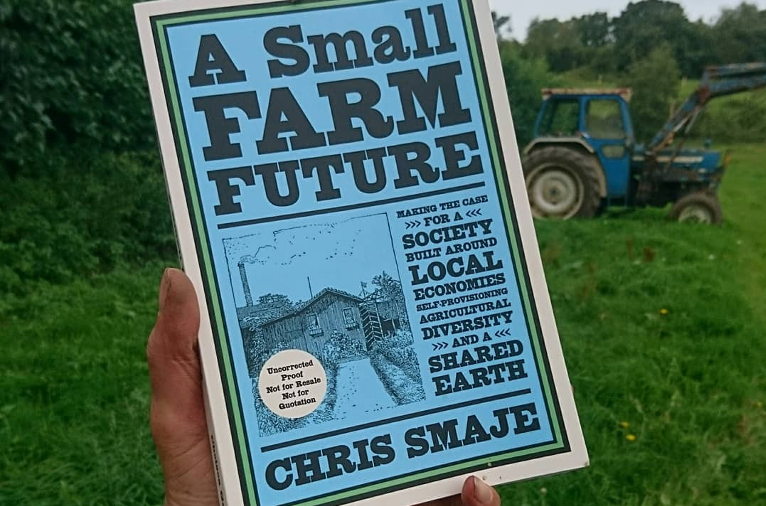A bit of news from the home front here at Small Farm Future, and a few reflections based around it. Today, my wife received a suspended prison sentence for disrupting a court as an act of protest against government inaction on climate change. Here is a short video she made explaining her behaviour and making the case for radical action beyond business as usual, with her own vision focused around small-scale farming. Please share it with your networks if you’re minded to – pebbles, ripples and all that.
At an earlier court appearance, she was troubled to be told by a magistrate that her right to protest climate policy had to be balanced against the right of people such as car drivers to go about their business. In her view, this encapsulated the distorted priorities of our decisionmakers in effectively trading off present niceties with the very stability of Earth systems that enable human and other lives.
Here’s an excerpt from the livestream of the court disruption, and here she is talking outside the court after her sentence with Shel, her partner in non-crime, with some good points well made by both of them, in my opinion.
I don’t know if her course of action today was the right one. She and I have discussed many times the choices to be made in the face of the world’s present looming crises and the limited powers of individuals, including the individuals in government, to effect change. I don’t think there can ever be clear answers to the question of what is to be done. But I’m pretty sure that we do need to do something orders of magnitude faster and deeper than current climate policies if we’re to meet the challenge. So why not glue yourself to a courtroom? It’s not as if anything else is working much better.
And it’s not just climate change. Globally, we face a whole series of intersecting crises that include climate change, energy descent, biodiversity loss, water stress, soil stress, economic stagnation, political fracturing, social inequality, violence and refugeeism – as copiously discussed on this blog over the years, and also in my book. It’s possible to dream up various responses to these issues, but I haven’t yet seen any plausible suggestions as to how to solve the whole caboodle in real time without the most wrenching social change, and probably not even then.
But wrenching social change is barely on the table in current public discussions. I guess I’m singing to the choir on this blog, where often enough I’m chided for my overly sunny presentiments for the future – but in the wider world it’s rare to find people thinking seriously about the unhappy collision of biophysical and social problems that’s upon us. Even among climate scientists, such as some of those who comment on Ken Rice’s excellent …and Then There’s Physics blog, I find a sometimes troubling degree of scorn for the ‘doomers’ who allegedly overstate the climate impacts to come. No doubt some folks do over-dramatize the negative impacts (while far too many others surely under-dramatize them), but I’m not sure that climate scientists always appreciate how fragile the web of connections is between stable climate, abundant energy, stable politics, renewable soil, renewable water, growing prosperity and non-destructive social inequality in our present world.
To be honest, I don’t think social scientists necessarily appreciate it either. The physicist Robert Davies made the nice point to me that while physics is a ‘hard science’, sociology is a ‘harder science’, because understanding the behaviour of matter is as nothing compared to understanding the behaviour of human beings. Nobody can possibly say how these complex intersecting crises will pan out. For sure, nobody can say that they’re certain to pan out well.
So, what is to be done? As a sociologist-farmer I potter along with a doomer optimist webinar here, a gene editing one there, a spot of small-scale farming along the way, and a few little bits of politicking, policy-ing and writing. Who knows if these are the right things to do? Maybe I should glue myself to a courtroom instead?
In the short-run, the right thing for me to do is try to step up into the very large hole in the work of my household and my farm that my wife’s absence has created. Happily, since she wasn’t actually jailed as we’d anticipated, this will be less onerous than I’d been preparing myself for – so more blog posts are imminent.
It just remains for me to salute my wife’s fighting spirit. And caring spirit. Cordelia Rowlatt, you are a force of nature. My only complaint is that I’ve had the jingle of that darned song in my head for days now, with no sign of respite …Oh, it isn’t nice to block the courtroom (fade)






